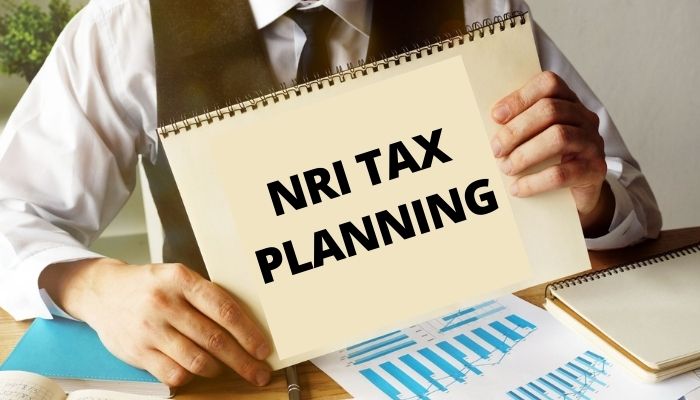Today we will discuss some tips for the NRI to save tax. We will understand this article in the following manner:
- Meaning of an NRI – for Taxation Purpose
- Planning of Tax for NRI
- NRI’s Taxable income
- NRI’s Tax-free income
- DTAA in a Simplified manner
- Tax Planning Tips for NRI
Definition of a Non-Resident Indian (NRI)
A person shall be considered as a non-resident when he/she has resided in India for a period of less than 182 days of the current financial year or if the person has been stayed in India for less than 60 days in the current financial year and has been for less than 365 days in the last 4 years in India.
Tax Planning for NRI’s
In India, the taxation rules for NRIs are different. In the following, we have discussed some tax planning information for an NRI to plan his taxes better-
The following income is tax NRI’s
- Income which has been earned, accrued, or to be earned or accrued through salary in India.
- Capital gains which have been received or deemed to be accrued from the transfer of property/ real estate or other capital investments in India.
- Interest income earned or income earned from capital gains of short-term investments and securities.
The following income of an NRI will be non-taxable
- Interest income earned from NRE (Non-residential external) accounts.
- An Allowances or Perquisites for his/her services outside India paid by the Government of India to an NRI.
- Income from Long-term capital gains from the sale of equity shares or units of equity funds but only when such transactions are subject to securities transaction
- Income earned on Interest on certain savings certificates and bonds which subscribed to foreign exchange.
Note – this is tax-free in India but it may be taxed in the country in which the person is currently residing.
Note: It is important to note that It’s not Legal for the NRIs to Hold a Resident Savings Account in India.
Information on DTAA
DTAA means Double Taxation Avoidance Agreement. It is an agreement that is created to ensure that people should not pay tax twice on the same income earned. It might be possible that a person may have not fulfilled all the conditions required to be an NRI and have earned the income in two countries say India and US. In this situation, the assessee will have to pay taxes on the income earned and investment income in the US and India. Assessee can avoid such double taxation by any of the following three methods –
- Pay tax in one country and get exemption from the second country.
- Deducting TDS from total income across all countries and then paying tax in the country that assessee are staying on the balance amount.
- Getting credit for tax paid in the country currently staying for income earned in a different country and deducting that amount in the country where it was earned.
If the assessee is getting credit for tax paid in one country, he should ensure that he has a Tax Residency Certificate (TRC) of such country.
Currently, India has is having a DTAA with 84 countries which may change from time to time. DTAA is a kind of mechanism which will help the assessee to reduce his tax burden. Although, It’s not a tool for tax evasion. You should be clearly understood the rules before opting for it.
Tax Planning for NRI’s
- Tax Filing – As an NRI, if the assessee income is more than Rs. 2,50,000 which he earned in India; he has to file tax returns. Although, the tax slabs will be applicable which are the same as residents. If the person has to claim a tax refund, he has to file a tax return. If he has a capital loss which is to be set off against capital gains, he has to file a tax return. In the ITR form, the assessee has to select the residential status as ‘NRI’ at the time of filing of tax returns. Assessee can check tax deducted at the source by downloading the 26AS Form where the details of tax collected are mentioned.
- Moving back to India – If you as an NRI planning to move back to India, then you should be considered as Resident but not ordinarily resident (RNOR) status. You can get this status if –
You have been as an NRI in 9 years out of the last 10 financial years
OR
You have resided in India for 2 years or less than 2 years in the last 7 financial years
If you continue to stay in India after that period, you will be treated as a resident, and taxation rules for resident Indians will start applying to you.
- Tax matters relating to the property– As an NRI, the assessee can own, buy and sell the assets outside India provided he conduct these transactions as an NRI without tax implications in India. Assessee can also inherit the property from NRI. However, if he/she plans to sell these assets after becoming a resident, then there will be capital gains tax liability under the Income-tax act in India. It is to be noted that, it may be better to sale assets as an NRI for better tax planning.
- Reduce Tax Liability – A person can reduce its tax liability by giving a gift to adult children and parents. you can invest in tax-free bonds issued. You can also create a HUF to take advantage of other separate exemption limits which are allowed for HUF. If you are not planning to return soon to India, you may convert your NRO deposits to NRE deposits which results in reducing tax liability. After completion of 2 years, NRIs returning to India will be treated as resident individuals.
Following are the examples for a better understanding of NRI tax planning:
- Nikhil is an NRI. He resides in Delhi. He wants to sell his house in India and buy a house in the United States. Are the capital gains taxable?
Income from Long-term capital gains from selling a residential house is got exempt from tax if such individual has constructed one residential house in India within a period of one year before or two years after the date of sale, or within a period of 3 years. Since Nikhil wants to buy property outside India, he will not get a tax exemption.
- Neha is living and working in Singapore for the last 8 years. She gifts a brand new car to her parents who are residents of India. Is such a gift taxable?
The car is a gift to a relative and hence such will not taxable for Neha or for her parents. It is also the best tax-saving plan.
- Mr. Mohit has been working in the US for many years now. He has also invested in many fixed deposits in India. Is the interest income earned taxable?
The taxability of interest income depends on the type of account-
– Interest on a non-resident ordinary (NRO) account
– Interest on resident accounts is taxable
– Interest earned on NRE accounts is not taxable
– Interest earned from deposits in the FCNR (Foreign Currency Non-resident) account is exempt from tax.
if you are an NRI then there is so much scope is given in the income tax act through which you can reduce your tax burden and steer away from the problems of tax evasion. You can also manage your wealth and income better when you can convert your status to Resident Indian.



Yes you can include some of the expenses like renovation work done etc. However payment transfer detail and receipt both are require as a proof.